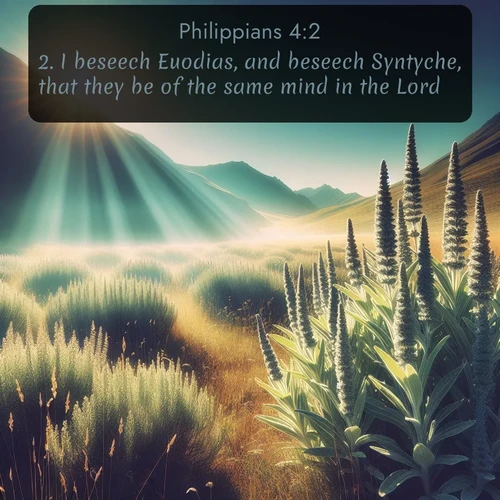Philippians 4:2 plusieurs versions / traductions
English Bible Translations
2. I beseech Euodias, and beseech Syntyche, that they be of the same mind in the Lord.
2. I exhort Euodia, and I exhort Syntyche, to be of the same mind in the Lord.
2. I make request to Euodias and Syntyche to be of the same mind in the Lord.
2. I exhort Euodia, and exhort Syntyche, to be of the same mind in [the] Lord;
2. I beseech Euodias, and beseech Syntyche, that they be of the same mind in the Lord.
2. Euodia I exhort, and Syntyche I exhort, to be of the same mind in the Lord;
German Bible Translations
2. Die Evodia ermahne ich, und die Syntyche ermahne ich, daß sie eines Sinnes seien in dem HERRN.
2. Euodia ermahne ich und Syntyche ermahne ich, eines Sinnes zu sein im Herrn.
French Bible Translations
2. J'encourage Evodie et Syntyche à vivre en plein accord dans le Seigneur.
2. J’exhorte Evodie et j’exhorte Syntyche à être d’un même sentiment dans le Seigneur.
2. J'exhorte Evodie et j'exhorte Syntyche à être d'un même sentiment dans le Seigneur.
2. Je supplie Évodie, et je supplie Syntyche, d'avoir une même pensée dans le Seigneur.
2. Je prie Evodie, et je prie aussi Syntiche, d'avoir un même sentiment au Seigneur.
2. J'exhorte Évodie, et j'exhorte Syntyche, à être d'un même sentiment dans le Seigneur.
Versions with Strong Codes
Philippians 4 / KJV_Strong2. I beseech[G3870] Euodias,[G2136] and[G2532] beseech[G3870] Syntyche,[G4941] that they be of the same mind[G5426] [G3588] [G846] in[G1722] the Lord.[G2962]
Strong Code definitions
G3870 parakaleo/par-ak-al-eh'-o from G3844 and 2564; to call near, i.e. invite, invoke (by imploration, hortation or consolation):--beseech, call for, (be of good) comfort, desire, (give) exhort(ation), intreat, pray. see G3844 see G2564
G2136 Euodia/yoo-od-ee'-ah from the same as G2137; fine travelling; Euodia, a Christian woman:-Euodias. see G2137
G2532 kai/kahee apparently, a primary particle, having a copulative and sometimes also a cumulative force; and, also, even, so then, too, etc.; often used in connection (or composition) with other particles or small words:--and, also, both, but, even, for, if, or, so, that, then, therefore, when, yet.
G3870 parakaleo/par-ak-al-eh'-o from G3844 and 2564; to call near, i.e. invite, invoke (by imploration, hortation or consolation):--beseech, call for, (be of good) comfort, desire, (give) exhort(ation), intreat, pray. see G3844 see G2564
G4941 Suntuche/soon-too'-khay from G4940; an accident; Syntyche, a Christian female:-Syntyche. see G4940
G5426 phroneo/fron-eh'-o from G5424; to exercise the mind, i.e. entertain or have a sentiment or opinion; by implication, to be (mentally) disposed (more or less earnestly in a certain direction); intensively, to interest oneself in (with concern or obedience):--set the affection on, (be) care(-ful), (be like-, + be of one, + be of the same, + let this) mind(-ed), regard, savour, think. see G5424
G3588 ho/ho, including the feminine to to in all their inflections; the definite article; the (sometimes to be supplied, at others omitted, in English idiom):--the, this, that, one, he, she, it, etc.
G846 autos/ow-tos' from the particle au (perhaps akin to the base of G109 through the idea of a baffling wind) (backward); the reflexive pronoun self, used (alone or in the comparative 1438) of the third person , and (with the proper personal pronoun) of the other persons:--her, it(-self), one, the other, (mine) own, said, (self-), the) same, ((him-, my-, thy- )self, (your-)selves, she, that, their(-s), them(-selves), there(-at, - by, -in, -into, of, -on, -with), they, (these) things, this (man), those, together, very, which. Compare 848. see G109 see G1438 see G848
G1722 en/en a primary preposition denoting (fixed) position (in place, time or state), and (by implication) instrumentality (medially or constructively), i.e. a relation of rest (intermediate between 1519 and 1537); "in," at, (up-)on, by, etc.:-about, after, against, + almost, X altogether, among, X as, at, before, between, (here-)by (+ all means), for (... sake of), + give self wholly to, (here-)in(-to, -wardly), X mightily, (because) of, (up-)on, (open-)ly, X outwardly, one, X quickly, X shortly, (speedi-)ly, X that, X there(-in, -on), through(-out), (un-)to(-ward), under, when, where(with), while, with(-in). Often used in compounds, with substantially the same import; rarely with verbs of motion, and then not to indicate direction, except (elliptically) by a separate (and different) preposition. see G1519 see G1537
G2962 kurios/koo'-ree-os from kuros (supremacy); supreme in authority, i.e. (as noun) controller; by implication, Master (as a respectful title):-- God, Lord, master, Sir.
Prédications qui analysent les thèmes Philippiens 4
Thèmes : Joie et paix; Exhortation à l'humilité; Pensées positives; Paul et ses compagnonsRelated Sermons discussing Philippians 4
Themes : Joie et paix; Exhortation à l'humilité; Pensées positives; Paul et ses compagnonssee also: Bible Key Verses ; KJV Bible Images, BBE Bible images

